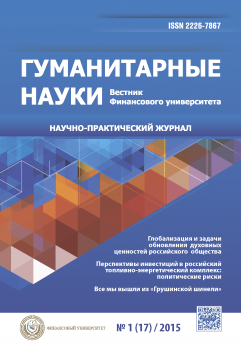In this article the timely causes, methods and mechanisms of the influence of economic elites on the democratic political power are examined. As the most glaring example, the author refers to the experience of the United States - the country that actively promotes the importance of practical implementation of democratic values. Studies, which were conducted by the American scientists in 2013– 2015, however, show that the interests of the majority of citizens are fundamentally at odds with the aspirations of the financially wealthy "elites" of the society, which is about 1% of the population. Also there is virtually no possibility of influence on the American politicians by the average citizens, as they don’t have both financial resources and personal connections. Due to the fact, this order of things provokes disparity between rich people and the rest of the population, that has already reached a historic highest point and left about 47 million of Americans below the poverty line. The author analyzes the statistics, surveys and researches were taken in the past few years, which allows to evaluate the situation in the country both "de jure" and "de facto". Then the conclusions of non-compliance of the declared democratic order and practically implemented are drawn, and also the ways which allow the economic elites to influence the public authorities are identified. It is not only the well-known practice of financial support of election campaigns, but also the lesser-known creation of commissions and meetings with the financial elites, giving the guidance to the authorities; the participation of representatives of business in the presidential meetings; opportunities of personal interaction between the economic elites and politicians. In general, this article, in the author’s opinion, is an argument in favor of a dangerous trend of turning the government from a socially oriented formation in a market-oriented actor in world politics, whose main objective is to get an economic profitability.
democratic government, economic elites, American society, market society, impact of the policies, average citizens, United States of America.
1. 1% of the super-rich happiness deprives the remaining 99%. Vesti economy. 2016. 13 January. Available at: http://www.vestifi nance.ru/articles/66245 (Accessed 12 January 2016)
2. Benjamin I. Page, Larry M. Bartels, and Jason Seawright. Democracy and the Policy Preferences of Wealthy Americans. March, 2013. Available at: http://faculty.wcas.northwestern.edu/~jnd260/cab/CAB2012%20-%20Page1.pdf (Accessed 03 February 2016)
3. David Callahan & J. Mij in Cha, Stacked Deck: How the Dominance of Politics by the Affl uent and Business Undermines Economic Mobility in America, DEMOS. February, 2013. Available at: http://www.demos.org/sites/default/fi les/publications/Demos-Stacked-Deck.pdf (Accessed 18 January 2016)
4. Benjamin I. Page, Larry M. Bartels, and Jason Seawright. Democracy and the Policy Preferences of Wealthy Americans. Available at: http://faculty.wcas.northwestern.edu/~jnd260/cab/CAB2012%20-%20Page1.pdf (Accessed 03 February 2016)
5. Allan J. Lichtman. Who rules America? Available at: http://thehill.com/blogs/pundits-blog/civil-rights/214857-who-rulesamerica (Accessed 23 January 2016)
6. Steven Rosenfeld. 8 Ways the Super Wealthy Show Their Cruel Values and Desire to Destroy the Public’s Safety Net. Available at: http://www.alternet.org/economy/8-ways-super-wealthy-show-their-cruel-values-and-desire-destroy-publics-safety-net (Accessed: 01 December 2015)
7. Benjamin I. Page, Larry M. Bartels, and Jason Seawright. Democracy and the Policy Preferences of Wealthy Americans. Available at: http://faculty.wcas.northwestern.edu/~jnd260/cab/CAB2012%20-%20Page1.pdf (Accessed 03 February 2016)
8. Steven Rosenfeld. 8 Ways the Super Wealthy Show Their Cruel Values and Desire to Destroy the Public’s Safety Net. Available at: http://www.alternet.org/economy/8-ways-super-wealthy-show-their-cruel-values-and-desire-destroy-publics-safety-net (Accessed 25 January 2016)
9. G. William Domhoff . The Class-Domination Theory of Power. Available at: http://www2.ucsc.edu/whorulesamerica/power/class_domination.html (Accessed 05 February 2016)
10. Noam Scheiber. 2016 Hopefuls and Wealthy Are Aligned on Inequality. Available at: http://www.nytimes.com/2015/03/30/business/candidates-and-wealthy-are-aligned-on-inequality.html (Accessed 10 February 2016)
11. Andres Solimano. Economic elites, crises, and democracy: alternatives beyond neoliberal capitalism . New York: Oxford University Press, 2014. P. 171.
12. Jason Furman, Sandra Black, Matt Fiedler. Income, Poverty, and Health Insurance in the United States in 2014. Available at: https://www.whitehouse.gov/blog/2015/09/16/income-poverty-and-health-insurance-united-states-2014 (Accessed 12 December 2015)





